English Edition

- By CNI
- Category: English Section
- Hits: 594
CNI News
24 November, 2023
Although Myanmar Ministry of Labor has directed to the agencies sending Myanmar workers abroad to go and resolve the workplace problems of Myanmar migrant workers within 30 days, the agencies did not come to solve the problems.
The agencies tend to come and solve the big problems only that are written about on social media and largely don't solve the problems that are not posted on social media, U Min Oo, in charge of labor affairs from the Foundation for Education and Development (FED) told CNI News.
" For example, the case of over 230 that took place at La Yaung a few days ago. They asked for help. But relevant agencies didn't solve the problem. At last they got into trouble. To the best of my knowledge, most agencies don't solve. But it depends on the situation. if the problem with many workers is widely known among the public, the agencies concerned tend to come and solve. If the problem with one or two workers, the workers get into trouble badly. If the problem is not serious or is not posted on social media, the agencies largely don't solve the problem." said U Min Oo.
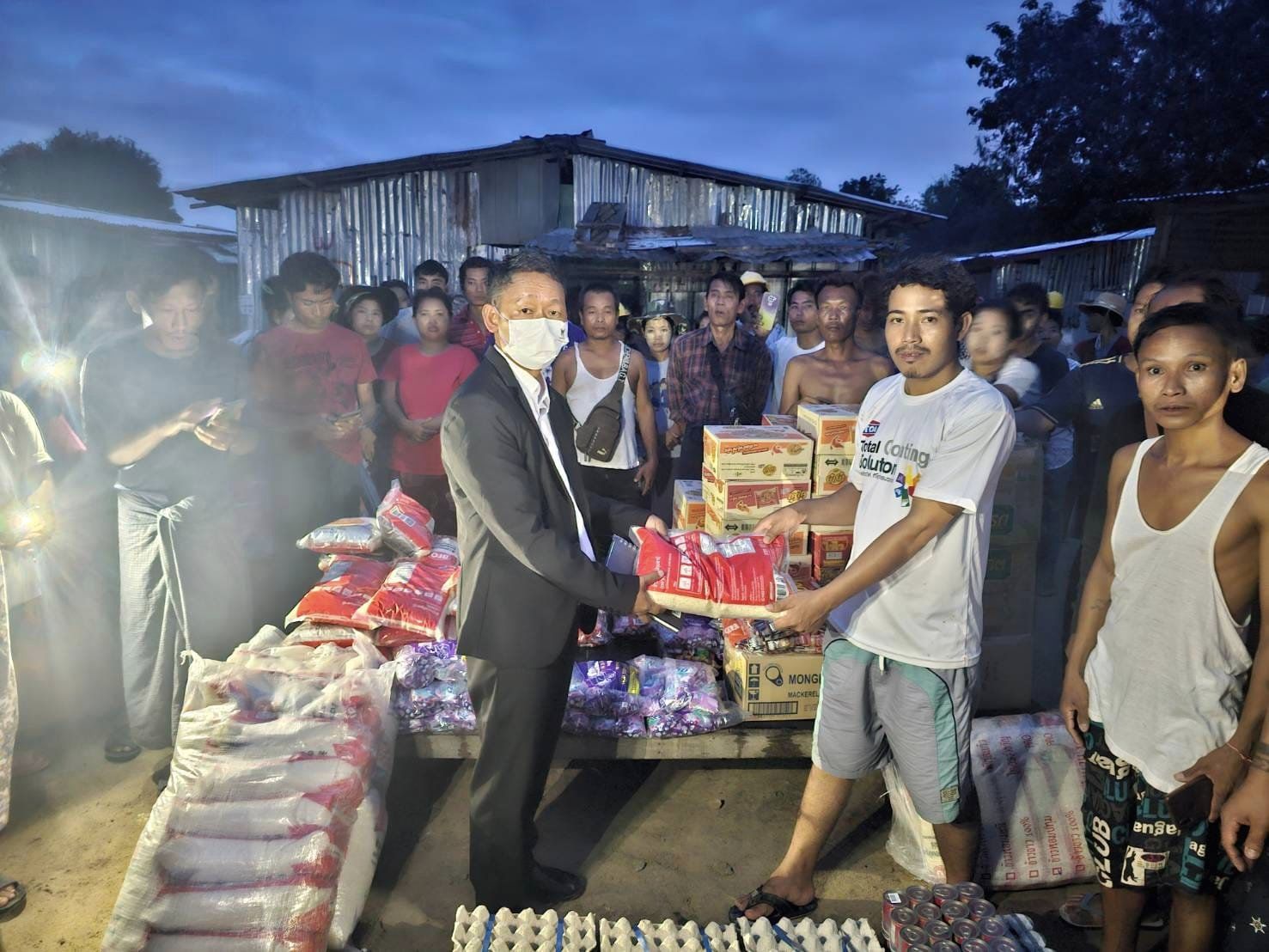
While labor officers were meeting with the labors from a construction site
Myanmar MoU workers are mainly facing with no consistence with the workplaces or employers that have been designated or being underpaid.
Some agencies come and solve by changing workplace within less than 30 days and others have evaded reportedly.
Although MoU workers can ask help from the labor officer from the embassy when the agencies concerned don't solve the problem, they tend to solve the problem with the help of the organizations that assist for the labor affairs because they are hesitant or unable to contact with the officer reportedly.
" When the workers called to the embassy to complain, the office might not answer the phone. Sometimes, the office asked which agency and told they would let the agency know. In order to help the workers effectively, ministry and labor officers need to comply with the law. If the agencies don't solve the problem within the period designated, they should be blacklisted at all." said Ko Thar Gyi, a person helping migrant workers.
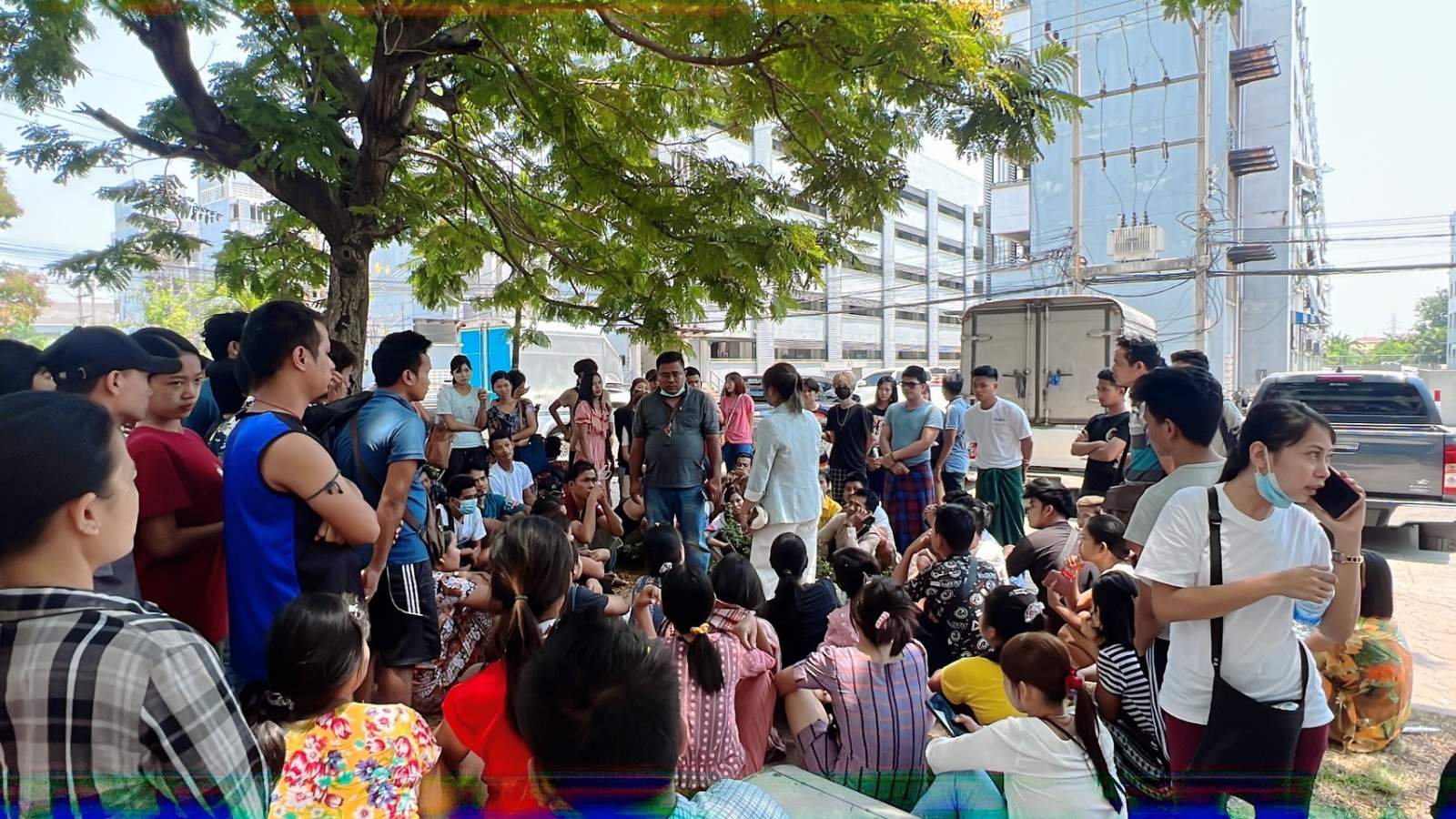
While an agency official was meeting with workers
Although the Ministry of Labor has directed to the agencies sending Myanmar workers abroad to go and resolve the workplace problems of Myanmar migrant workers within 30 days, the agencies don't solve the problem. It is because of weak taking action, those helping workers pointed out.
If labor problems or special events occurred, the agencies needed to report to the officials concerned and would have to cooperate with labor officers real time, which the ministry has directed.
At present, the ministry has blacklisted 126 Thai companies, 20 Thai agencies and 125 Thai citizens Thai that violated labor rights.

- By CNI
- Category: English Section
- Hits: 1006
CNI News
23 November, 2023
Rsidents of Naung Pu Aung Village in Homalin Township have to be displaced by battles, a local told CNI News.
The battles are severely taking place between the Shanni Nationalities Army (SNA) and the KIA/PDF joint forces in Hlwazingon Village near Naung Pu Aung Village reportedly.
Residents from Naung Pu Aung and Hlazingon went to their relatives in nearby villages and were staying away from the battle, a Naung Pu Aung resident told CNI News.
" Naung Pu Aung villagers went to Namscar and Narmaw Villages to avoid the battle. All the villagers who think the battle will spread to Naung Pu Aung have moved to Namscar. A few people are still in Naung Pu Aung. But there is no one in Hlwazingon." she said.
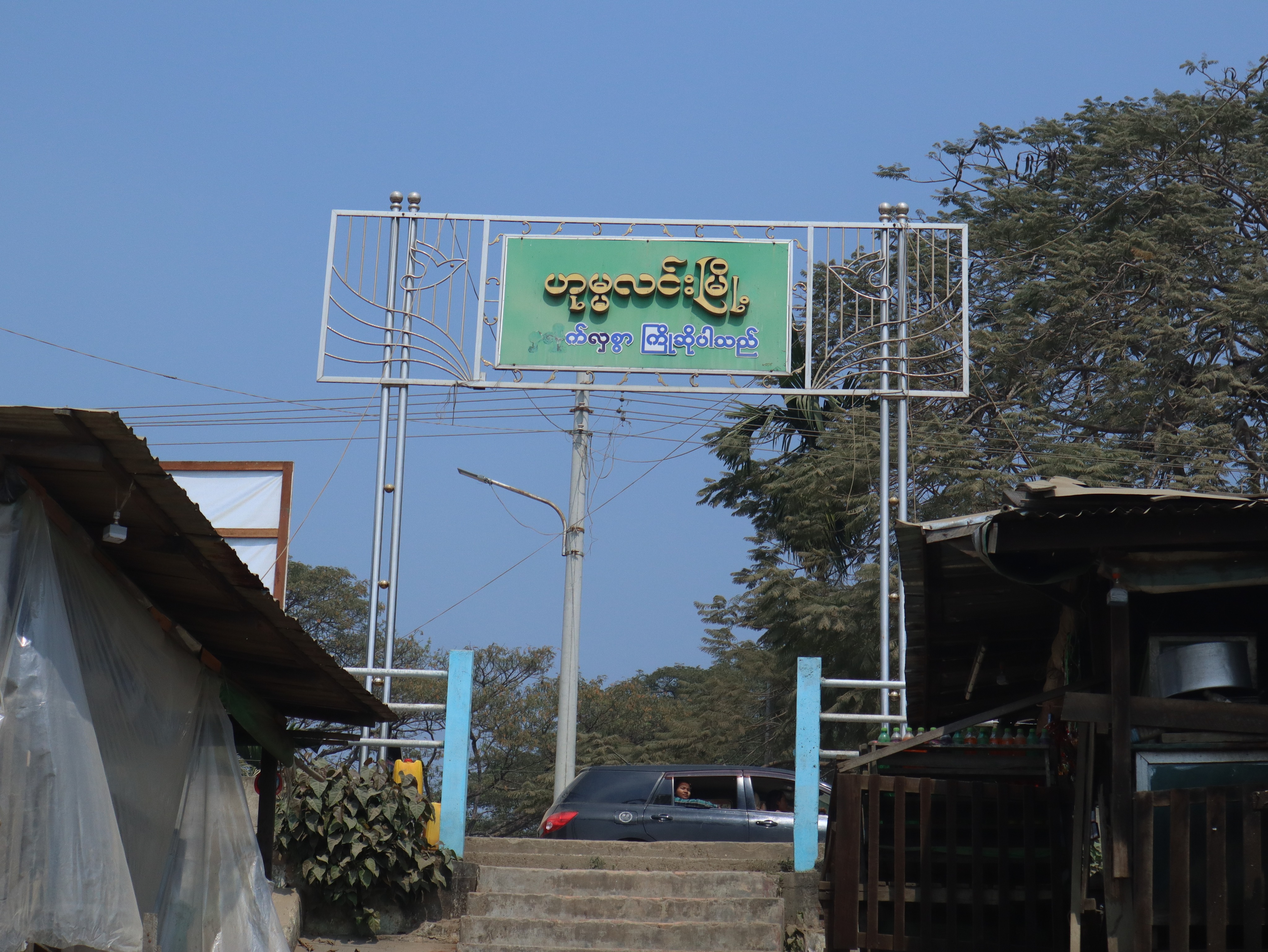
While seeing Homalin Town
Although the current period is the time of harvesting rice paddy, paddy field were left without being harvested, she said. The KIA/PDF joint forces attacked Hlwazingon, Phar Nine Villages and Shwe Pyi Aye Town at the same time on 21st November 2023 and until now, the two sides are in military tension.
Due to the battles, many residents of Shwe Pyi Aye went to Homalin Town to avoid battles reportedly. That the KIA/PDF joint forces were fighting against the SNA rather than security forces caused conflict between ethnic groups, Maj-Gen Zaw Min Tun, leader of the Information Team of the State Administration Council stated on the night of November 22.
" The battle broke out between the SNA and the KIA/PDF joint forces at Naung Po Aung, in the northwestern part of Sagaing Region. They (the KIA/PDF joint forces) are creating the conflict between the ethnic groups rather than fighting against the government security forces. It is leading to utter devastation. We all ethnic people must be aware of it. In cooperation with the security forces, the entire people must eradicate the insurgents with this kind of subversive mentality to restore stability and peace in Myanmar." said Maj-Gen Zaw Min Tun.
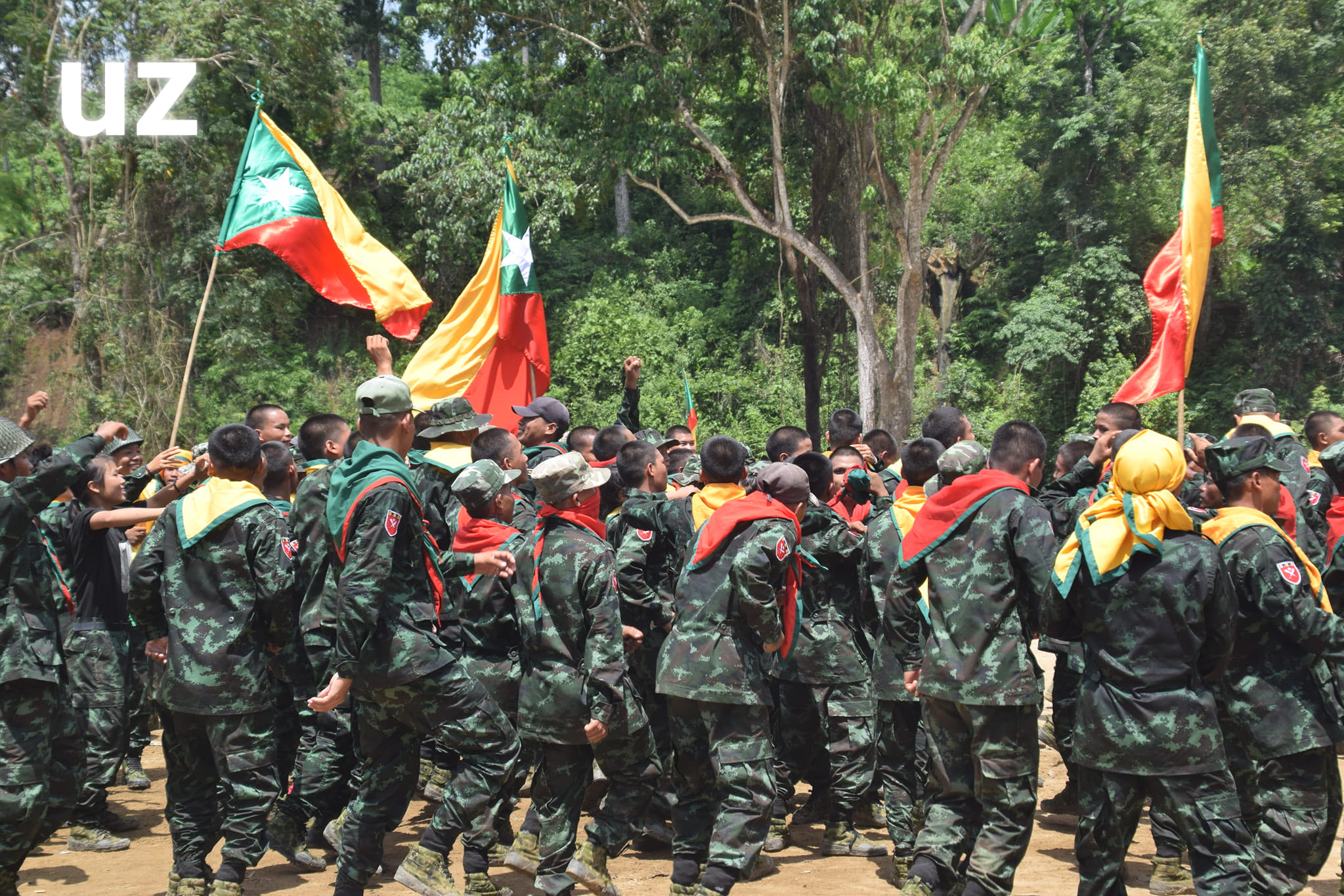
While seeing the Shanni Nationalities Army (SNA)
The battles often break out between the SNA and the KIA/PDF joint forces in Hlwazingon Village near Naung Po Aung, and Aung Bin Village starting from July.
The SNA is an ethnic armed group that is trying to restore Shanni State by bringing together Mawlike, Kalay, Khamti, Katha and Tamu Districts in Sagaing Region, and Bhamo, Myitkyina and Moe Nying Districts in Kachin State.

- By CNI
- Category: English Section
- Hits: 579
CNI News
23 November 2023
Nearly 2,000 Chinese citizens who were working in the online gambling and online scams (Zhapian) were arrested by the State Administration Council and handed over to the Chinese government on 21st November 2023 reportedly.
Of them, 1,816 people are men and 43 are women and a total of 1,859 people were handed over to the Chinese government.
The Chinese government is negotiating with the SAC to arrest the Chinese employers and employees doing business of online scams and hand over them to China.
However, due to the fact that no effective measures were taken, shouting slogans that they would suppress those working in online scams and eradicate dictatorship, the Three Brotherhood Alliance (the MNDAA, the TNLA and the AA) launched the Operation-1027.
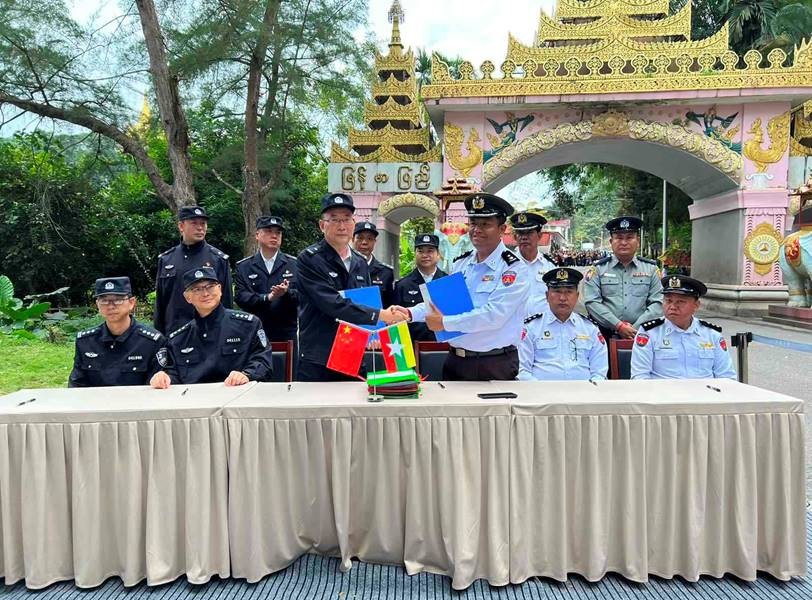
The operation is attacking the Tatmadaw camps in Mong Ko, Chin Shwe Haw, Theinni, Naunghkio, Namkham, Phaung Sai, Kyukote (Pang Sai) and has captured some towns.
China was behind the operation or China allowed the Three Brotherhood Alliance to launch the operation, which domestic politicians have believed. After that, the SAC
started cracking down on online gambling businesses and the culprits were handed over to China only when the military pressure has increased, they pointed out.
The SAC has already handed over 3,918 Chinese citizen including 185 women who were working in online scams to China from 31st October to 21st November 2023.

- By CNI
- Category: English Section
- Hits: 573
CNI News
23 November 2023
Pyin Oo Lwin- Naunghkio-Kyaukme Road, part of the Mandalay-Muse Union Road that was destroyed by the TNLA/PDF joint forces has been already repaired and that road could be normally used, the State Administration Council stated.
The TNLA/PDF joint forces had blocked the road by digging ditches and by chopping trees and by piling earth up on the road in a place near Shwe Nyaung Bin, a place near Legyin Gway Village, a place near Omkha Village, a place near the Goattwin Viewpoint, a place at a Naungpat fork in the road and seven places between Naungpit and Naung Pein Villages in Naunghkio Township.
After that, the SAC repaired the road, conducting security starting from 6th November. So, people can go to Pyin Oo Lwin, Naunghkio and Kyaukme normally at present.
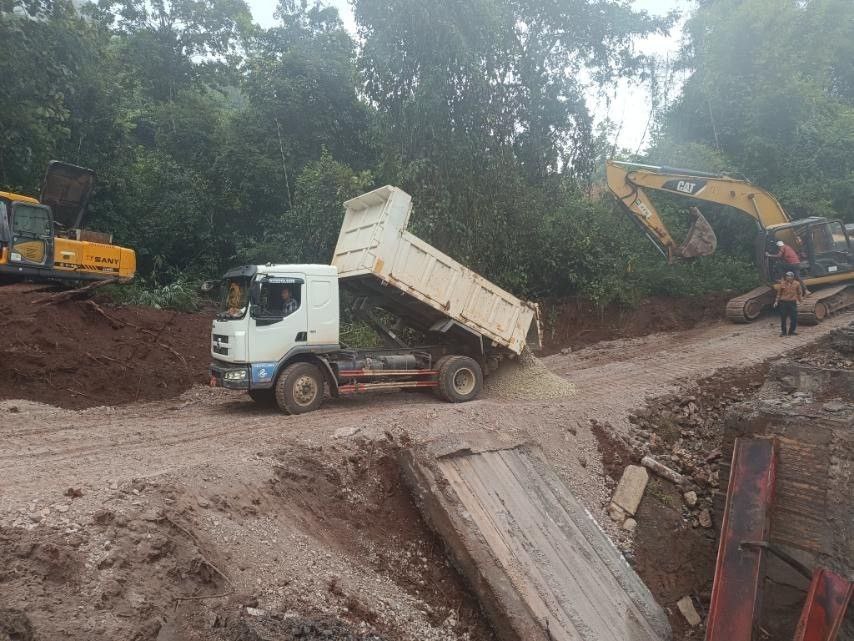
When the Pyin Oo Lwin-Naunghkio-Kyaukme road had been destroyed by the TNLA/PDF joint forces
" Because we can use the road again like before, it's convenient for the residents like us. We will be able to control the high prices again. When the economy was in trouble, it was a bit of a relief to be able to trade again." said a Kyaukme resident to CNI News.
After participating in the Operation-1027 led by the Myanmar National Democratic Alliance Army (MNDAA), the TNLA/PDF joint forces have been fighting against the Tatmadaw in Naunghkio, Kyaukme, Thibaw, Namkham, Lashio Townships starting from 27th October 2023.
And then, the joint forces destroyed and blocked the road so that the Tatmadaw could not provide reinforcements from the Mandalay side However, the Tatmadaw has been able to control the road between Pyin Oo Lwin and Kyaukme again and the road could be used normally, the SAC stated.

- By CNI
- Category: English Section
- Hits: 592
CNI News
23 November, 2023
The battles are severely breaking out between the Tatmadaw and the Arakan Army (AA) in Rakhine State and locals are facing with more difficulties, locals told CNI News. Due to the battles, roads and waterways have been closed in Rakhine State. So, it was difficult to get around for health issues and the flow of goods also has stopped, a local from Rathedaung Township told CNI News.
"Because the roads and waterways have been closed when the battles are severely taking place now, we are finding it difficult for health issues. If you have to transport the patients who will undergo surgery or emergency patients, you might need to use road or waterway. So, locals get into trouble. As the roads and waterways have been closed, the commodity prices have risen exponentially. And because the flow of goods has stopped at all, goods are almost out of stock."
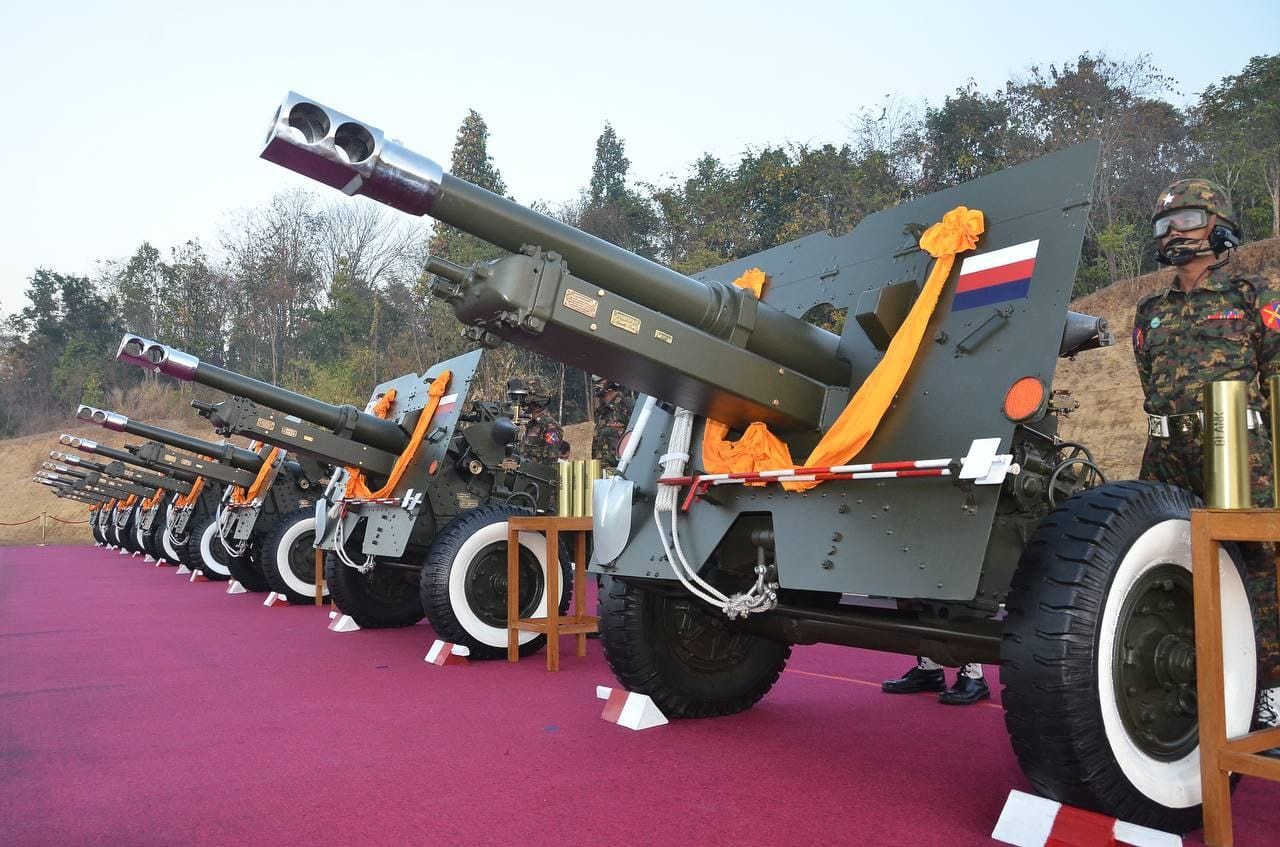
While seeing the Myanmar Tatmadaw's ordnance corps
After the battles between the Tatmadaw and AA resumed in Rathedaung, Kyauktaw and Minbya Townships on 13th November, roads and waterways have been closed. At present, all the trades have stopped. Pauktaw Town are being fired by heavy weapons, a Sittwe resident told CNI News.
" Local people are facing with various kinds of difficulties. There is no transportation. There is no more trading as well. It's not convenient for us to receive medical treatment. The big weapons have been shooting at Pauktaw from over Sittwe City since yesterday. The whole city has been quiet. Everyone is worried. Because big guns are being shot from over us. Cannonballs may come to us." he said.
At present, battles are severely breaking out in Pauktaw and residents of the town have fled to safety. Firing heavy weapons into non-combat areas should not conducted, said a resident of Rathedaung.
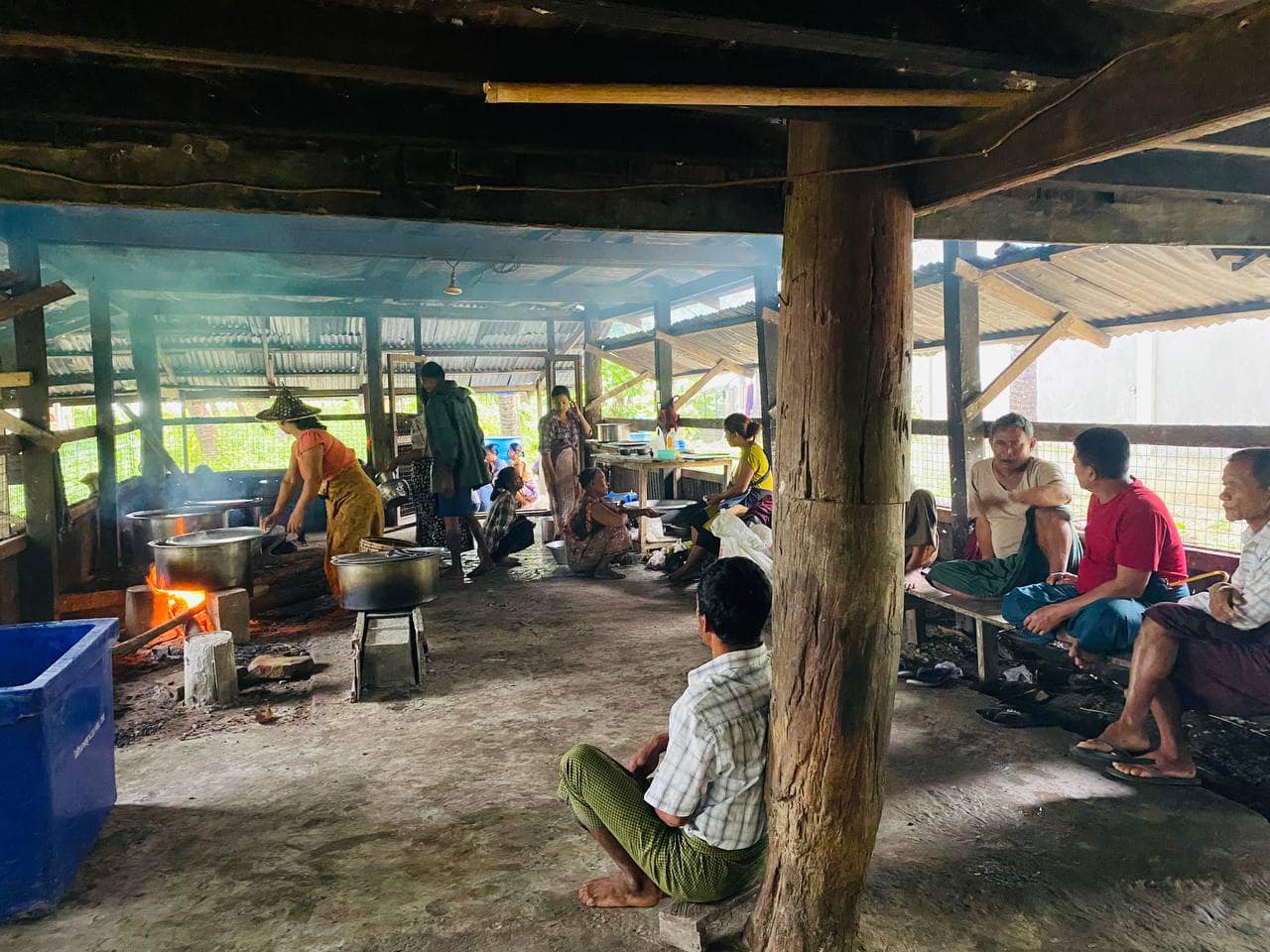
While seeing IDPs
" Firing heavy weapons into non-combat areas is too bad. Because of firing heavy weapons into non-combat areas on purpose, the people have to displace unnecessarily." he said.
At present, the battles are taking place between the AA and the Tatmadaw in Rathedaung, Kyauktaw, Minbya, Mrauk U, Pauktaw and Maungdaw Townships, Rakhine State and in Paletwa Township, Chin State.
Moreover, in cooperation with other armed groups, the AA is fighting against the Tatmadaw in Sagaing Region and northern Shan State.

- By CNI
- Category: English Section
- Hits: 850
CNI News
22 November 2023
Myanmar Ministry of Labor has blacklisted 126 Thai companies, 20 Thai agencies and 125 representatives of Thai employers due to labor rights violations reportedly.
Due to non-compliance with regulations and labor rights violations, Thai companies, agencies and individuals in question have been blacklisted reportedly.
" Even though some Myanmar workers went with MoU, Thai employers didn't pay full salaries. Some Thai employers didn't pay their employees overtime fees. Sometimes, Myanmar workers were called for A job according to the contract, but they were sent to B job or C job. These problems were solved by relevant companies and labor officials. But it was not convenient. So, they have been blacklisted." said U Myat Thu, general secretary of the Myanmar Overseas Employment Agencies Federation, to CNI News.
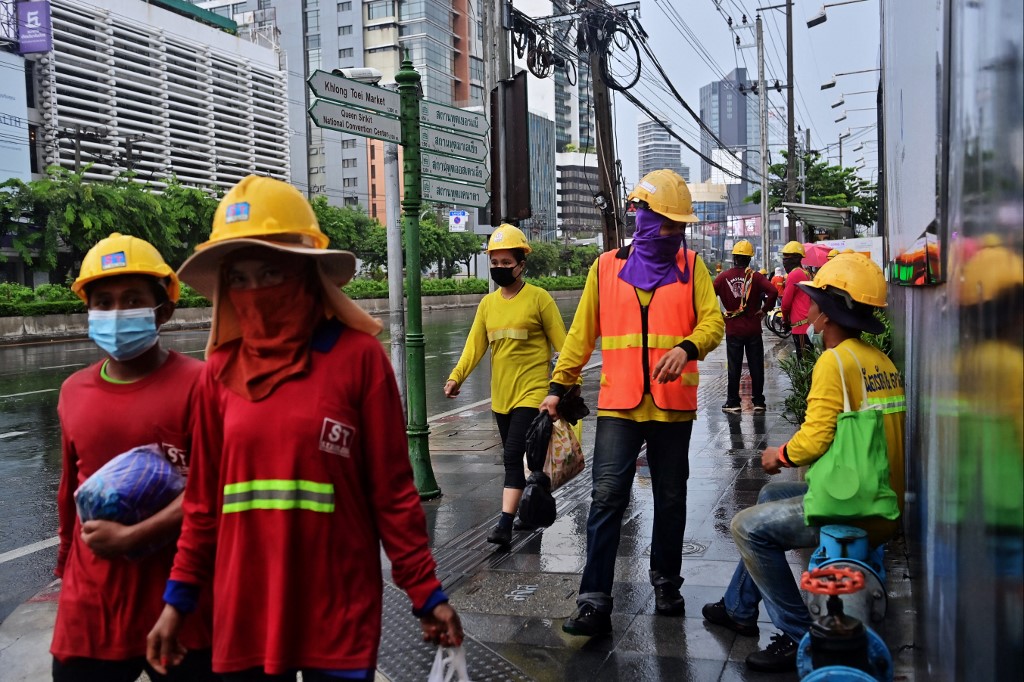
While seeing Myanmar workers in Thailand
Because the problem of MoU workers' rights being violated could not negotiated by labor officials, the companies should not blacklisted, those who carry out in the affairs of labors pointed out. As some associations that help in the labor affairs tend to negotiate in some cases, labor officials should coordinate, said the people who perform labor affairs.
The agencies in Myanmar that were blacklisted tend to change their agencies' names and the agencies that were blacklisted also would change their names, Ko Naing Naing Aung, director of the Arakan Workers Organization, told CNI News.
" Is taking action real? Is it effective? We need to review it. An MoU worker - if his rights were violated, he should get reasonable compensation. If the companies and agencies didn't give compensation to him, the government needs to give because he had to invest his hard-earned money to get that job. Blacklisting alone is not enough. Those who committed rights violation should be punished or they should be asked to compensate the victimized." said Ko Naing Naing Aung.
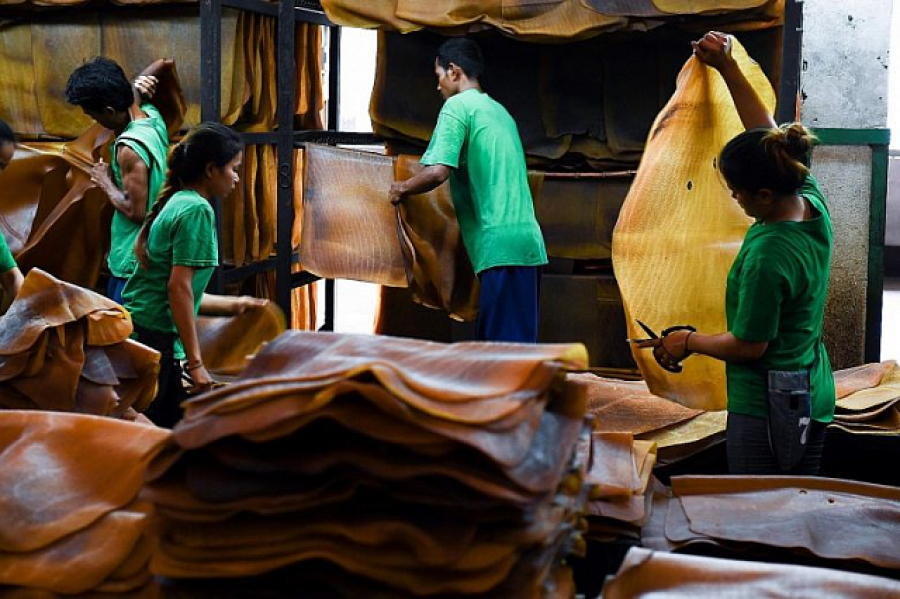
While seeing Myanmar workers in Thailand
If there are Myanmar workers who have already paid the cost to the blacklisted Thai companies and agencies, the cost should be given back to the workers, suggested those who carry out for the labor affairs.
Moreover, if there are Myanmar workers who are working in the blacklisted companies, they should be changed to other workplaces, they suggested.

- By CNI
- Category: English Section
- Hits: 571
CNI News
22 November 2023
As there are instabilities in many parts of the country, tourism industry may plummet this year, tourism and hotel operators told CNI news agency.
Because the battles are taking place between the Tatmadaw and some EAOs in northern Shan State, Kayah State, Sagaing Region and Rakhine State, they reviewed like that.
" Tourism industry entirely depends on regional stability. If there is no stability, tourism industry can can plummet again. Normally, a lot of tourists were likely to travel in November. this year. There were a lot of hotel bookings as well. But tourists are afraid of travelling due to the current instabilities. There have been more and more cancellations of hotel bookings. So, tourism industry can plummet again”said U Naung Naung Han, Myanmar Tourism Entrepreneurs Association.
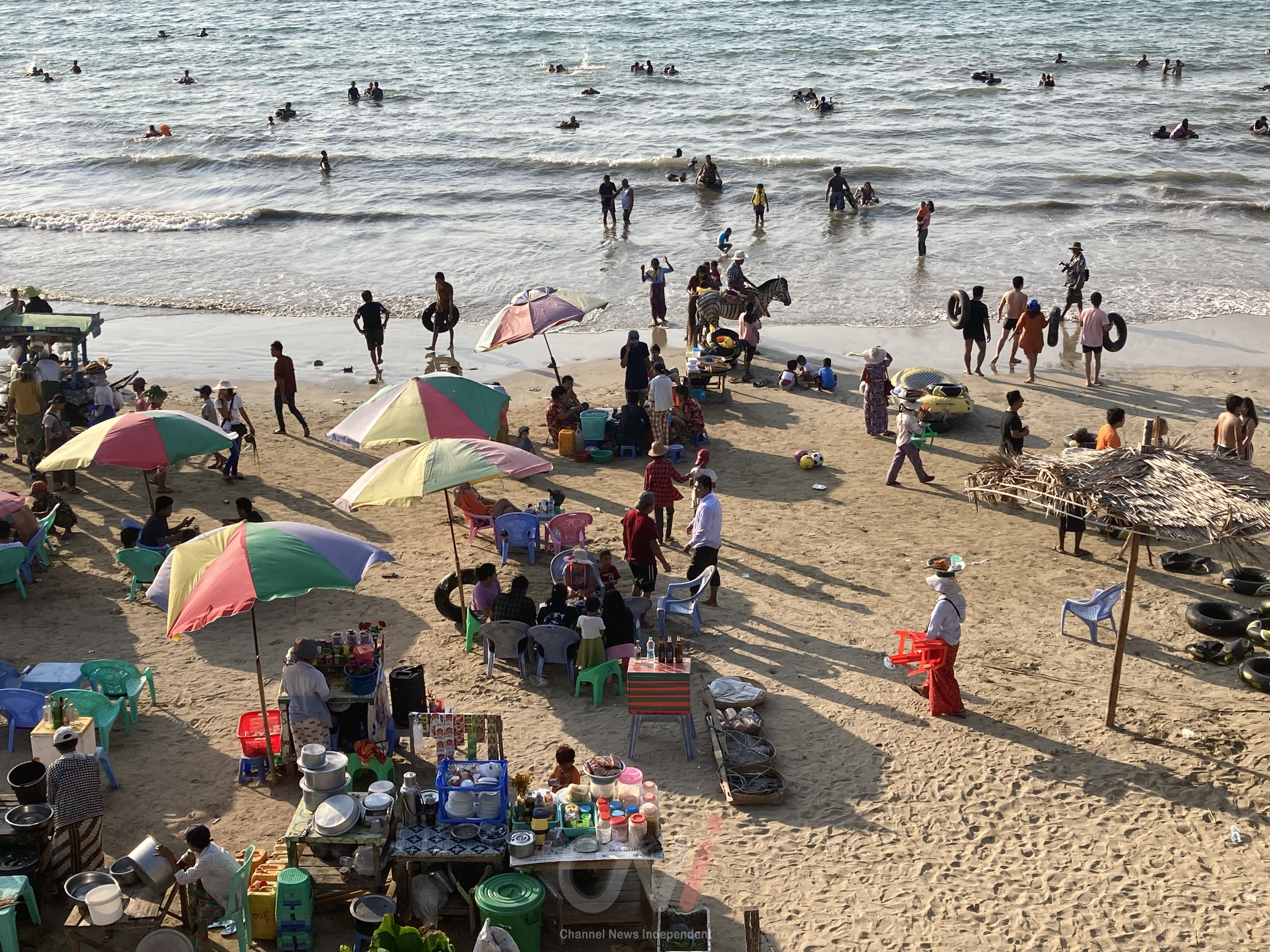
A view of Chaungtha Beach
Although tourist associations and private operators are trying to attract more tourists, the country's image is declining due to the current instabilities.
The Myanmar tourist industry plummeted due to the Covid-19 pandemic and political changes.
However, because stakeholders tried from all sides to recover, the tourism industry improved to an extent for the 2022-2023 season.
However, due to the current regional instabilities, stakeholders have to work twice as hard than before to recover the tourism industry for the 2024-2025 season, U Zaw Zaw, chairman of the Hotel Entrepreneurs Association (northern Shan State), told CNI News.
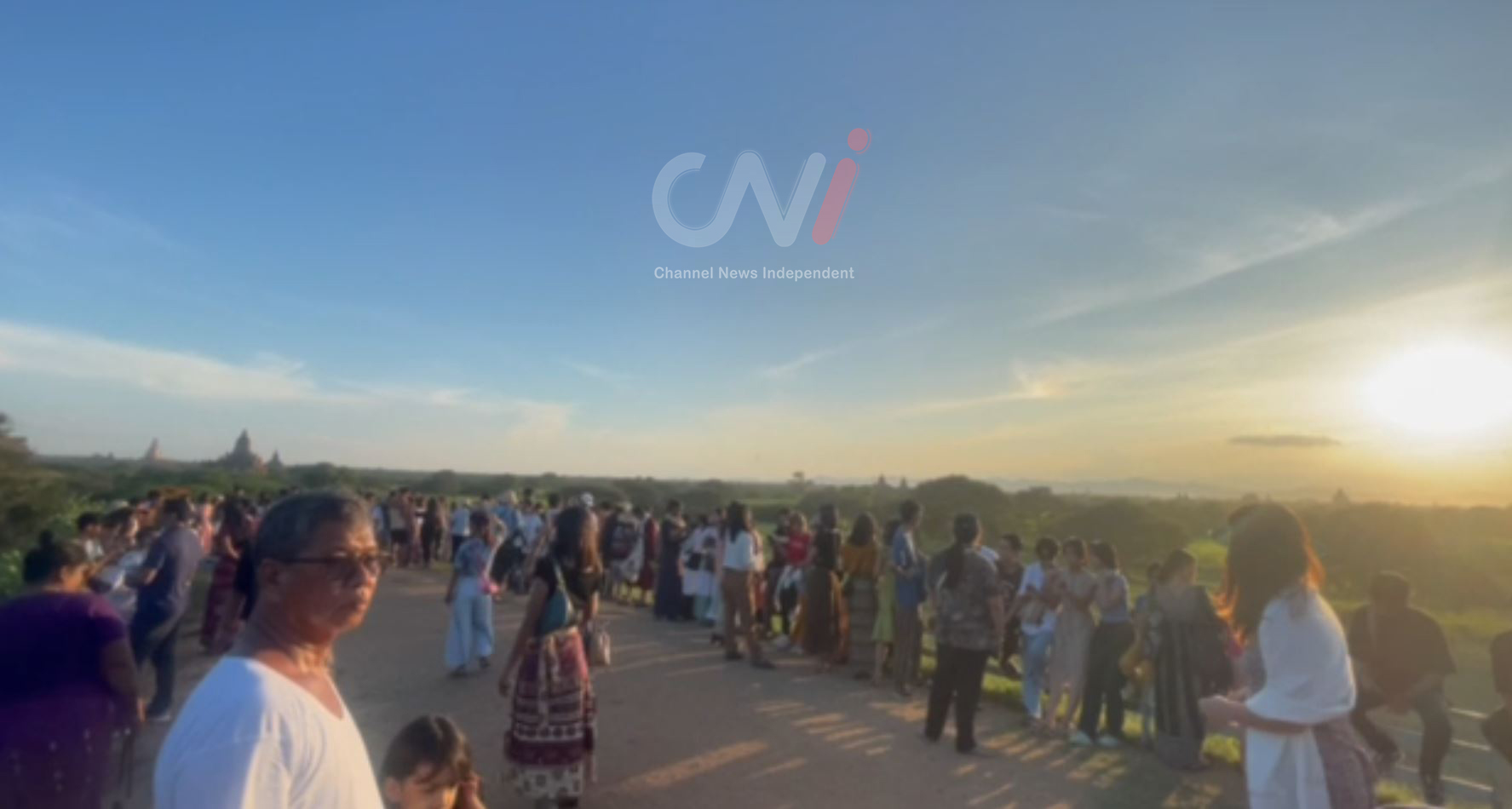
Tourists watching the sunset in Bagan
" Compared to last year, I think this year will be quite difficult. Peace is the main thing. People travels only when there is peace. .The sooner peace is achieved, the more people will travel. There will be no peace until Thingyan and the roads will be closed. if the people feel insecure, they won't travel. We have to work as hard as twice than before. We have to carry out to make tourists safe firstly. We must be able to plan tours of public interest." he said.
There have been a lot of cancellations of hotel bookings due to the current regional instabilities in Myanmar, according to tourism entrepreneurs.
During the Thadingyut holiday from 28th October to 30th October, more than 100,000 tourists entered Bagan and over 7,000 tourists including 500 foreign tourists, Ngwe Saung and 4,000 tourists including 70 foreign tourists, Ngapali.

- By CNI
- Category: English Section
- Hits: 682
CNI News
22 November 2023
There are reviews and discussions among the political circles about whether Myanmar could disintegrate if the armed conflicts taking place in the country could not be controlled.
If the Tatmadaw was not able to successfully handle the armed conflicts breaking out in the border areas, the country could disintegrate.
So, the Tatmadaw needed to carefully handle it, said U Myint Swe, Acting President of the State Administration Council at the meeting of the National Defense and Security Council held on 8th November 2023.
although there was no such thing as a state of collapse of the country, the country could become like Syria, U Ba Shein, a Rakhine politician, told CNI News.

While seeing U Myint Swe
" There might not be a situation where the country can disintegrate. It might be the same problem as in Syria. But it's very important that how China, Myanmar's neighboring powerful country, could help to make Myanmar convenient. India's help is also considered important." said U Ba Shein.
Because there were also separatist movements in Myanmar's neighboring countries - China, India and Thailand, these countries would not want Myanmar to disintegrate, domestic politicians pointed out.
Myanmar gained her independence on 4th January 1948 and internal armed conflicts began to emerge in March that year.
The armed conflicts have not been able to be solved up to now. In addition, due to political changes after 1st February 2021, armed conflicts have become more widespread across the country.
The Three Brotherhood Alliance waged battles capturing towns and cities during its Operation-1027 that started on 27th October 2023. In the same way, revolutionary forces also waged battles capturing towns and cities.
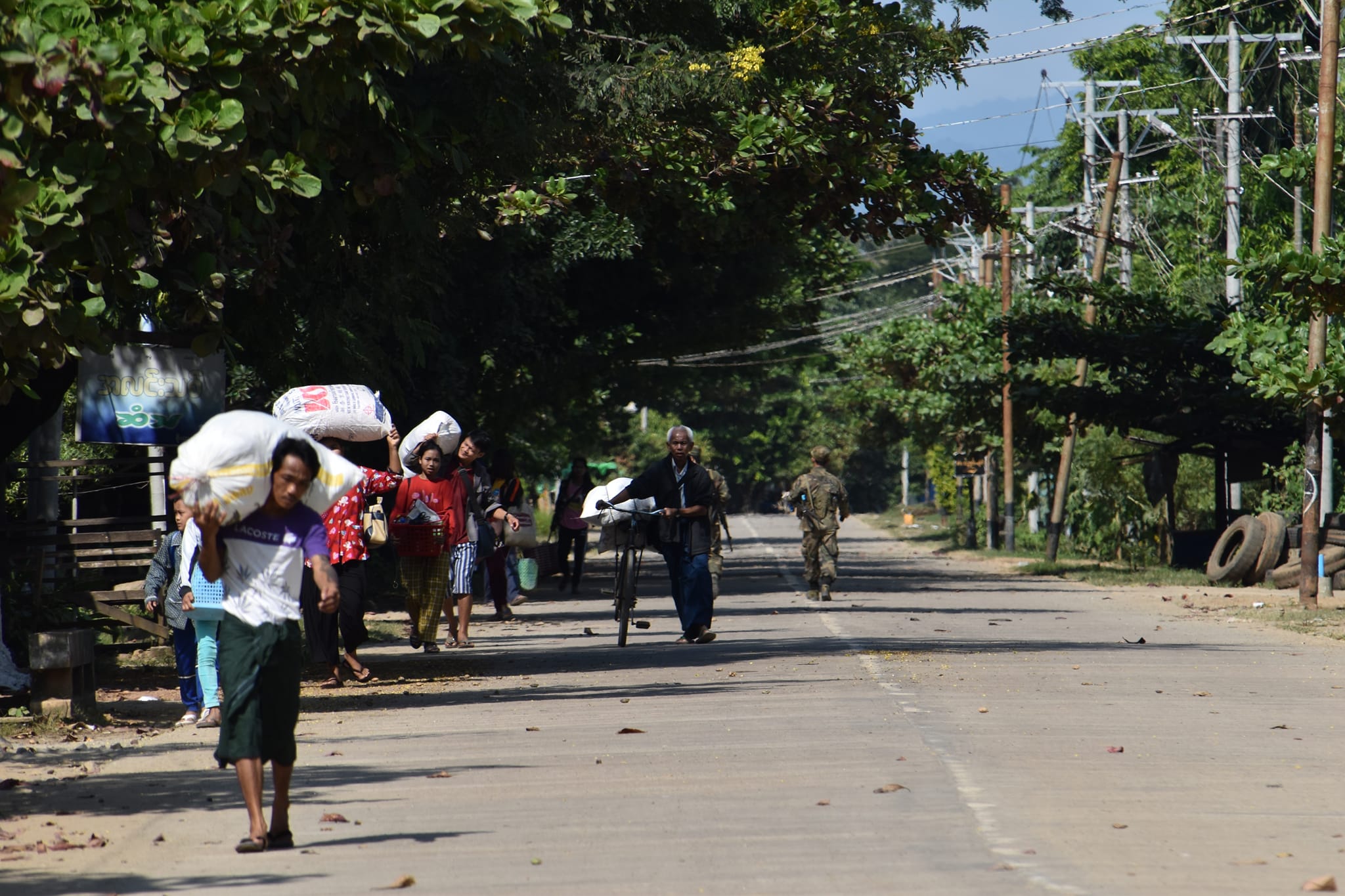
While seeing Kawlin residents and a comrade from the PDF
Although the country might be disintegrate, revolutionary forces have not yet been oneness, Sao Khun Sai, a participant in the peace process, told CNI News.
" The country might disintegrate. It is also possible to reassemble without disintegrating. Because the PDF and most EAOs are fighting against the Tatmadaw for the time being, it is true that the influence of the Tatmadaw is declining. And its military strength also has been affected. But the Tatmadaw is still oneness. But revolutionary forces haven't been oneness. In order to win, it's necessary to be a unified leadership." he said.
The Battles are currently breaking out between the Tatmadaw and revolutionary forces including some EAOs in Kayah, Kayin, Rakhine, Chin States, Sagaing and Magway Regions.
As a result of these battles, civilians were injured and killed. Moreover, houses were damaged or burnt down and many civilians fled to safety. The country's politics, peace, economy, health and education are deteriorating.

- By CNI
- Category: English Section
- Hits: 1104
CNI News
21 November 2023
The Tatmadaw did not use poison gas bomb while it was fighting against the Ta'ang National Liberation Army (TNLA). said Maj-Gen Zaw Min Tun, leader of the Information Team of the Tatmadaw on 19th November 2023.
When the TNLA had captured the heavy weapon hill, a new camp of the Tatmadaw, the Tatmadaw used poison gas bomb to attack the TNLA, the TNLA stated on 19th November 2023.
In the same way, it also stated on 4th November 2023 that the Tatmadaw attacked with the poison gas bomb during the Mong Kyet camp battle in Lashio Township.
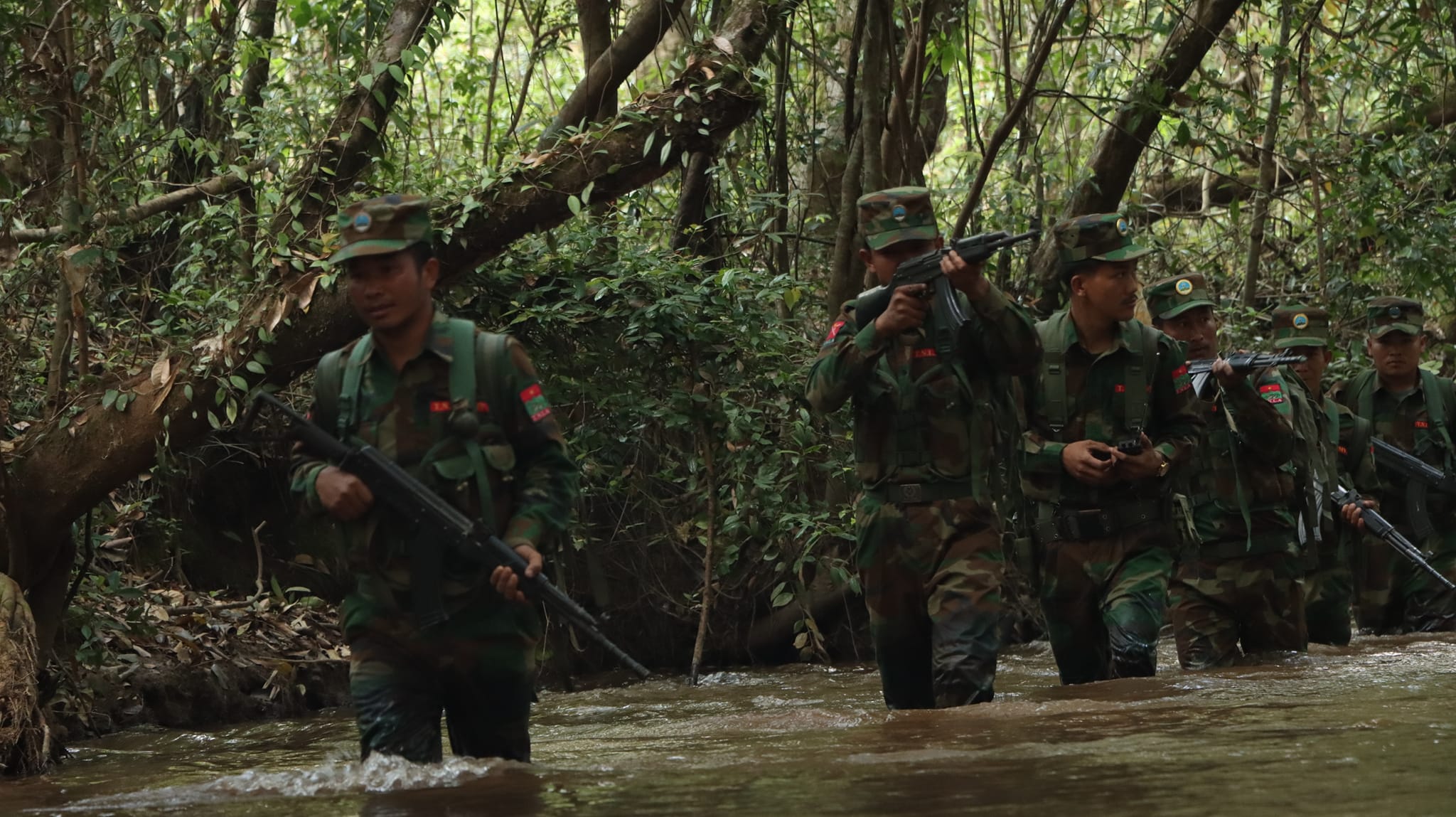
While seeing the TNLA forces
" The TNLA forces attacked our Kar Kin Gon (defense outpost hill) in Namkham and the Tatmadaw also attacked back. As usual, they complain like that when there are more casualties on their side. Because the frontline security camps in Namkham counterattacked bravely to the enemy, so many enemy troops were killed. I'd like to say that heads of State and the Tatmadaw are proud of officers, soldiers and warrioresses all who fought back against the enemy bravely." said Maj-Gen Zaw Min Tun.
The Tatmadaw would crush down the invaders and carry out for the territorial stability, said Maj-Gen Zaw Min Tun.
The TNLA has requested neighboring countries and international community to take action against the Tatmadaw that fought with poison gas bomb.
Due to the poison gas bomb used by the Tatmadaw, some TNLA comrades were similarly poisoned and they were feeling dizziness, breathing fast, nauseous, rapid excitement, fatigue, severe oxygen deficiency and they are being cured by the TNLA's health department, said in the statement released by the TNLA.
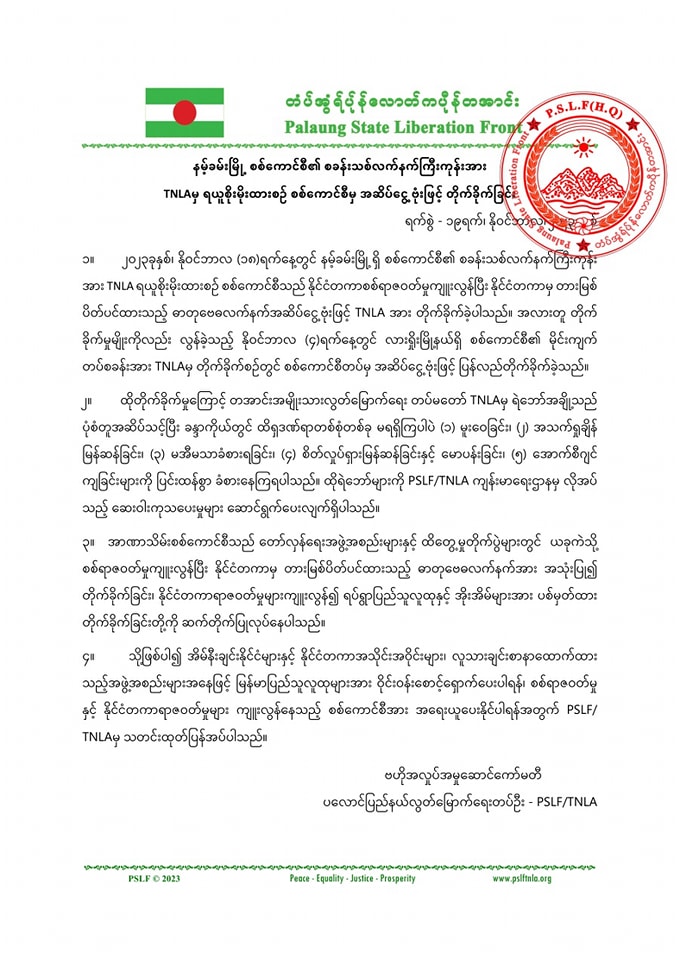
While seeing the statement released by the TNLA
Regarding the statement that poison gas bombs were used, it was difficult to prove and the Tatmadaw would use any weapon that it could, U Than Soe Naing, a Myanmar political commentator, told CNI News.
" Regarding that, it's hard to say. But military council will use any weapon that it can. It was said not long ago that the Tatmadaw used cluster bombs.. But any technological evidence was not found. We can only speculate on the impact. Besides, regarding the bomb was dropped on the KIA refugee camp, it has not yet been identified what the bomb is. So, it's difficult for me to give an opinion." said U Than Soe Naing.
With its allies - the Arakan Army and the Myanmar National Democratic Alliance Army (MNDAA), the TNLA is waging the Operation-1027 in northern Shan State and fighting against the Tatmadaw.



